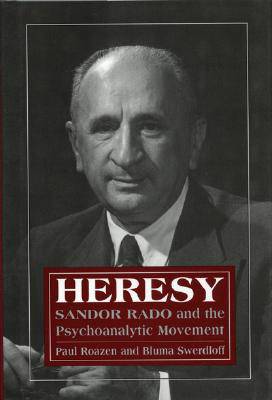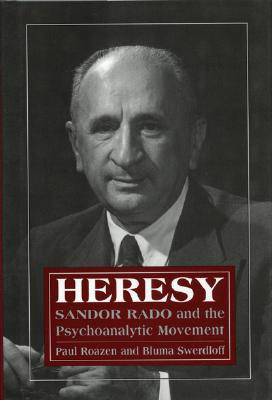
- Retrait gratuit dans votre magasin Club
- 7.000.000 titres dans notre catalogue
- Payer en toute sécurité
- Toujours un magasin près de chez vous
- Retrait gratuit dans votre magasin Club
- 7.000.0000 titres dans notre catalogue
- Payer en toute sécurité
- Toujours un magasin près de chez vous
Heresy
Sandor Rado and the Psychoanalytic Movement
Paul Roazen, Bluma Swerdloff
Livre relié | Anglais
108,95 €
+ 217 points
Description
'My mother was the source of my brains and my father the mother of kindness, ' said Sandor Rado, a Hungarian analyst whom Freud first embraced but with whom he was later displeased. In Heresy: Sandor Rado and the Psychoanalytic Movement, Paul Roazen and Bluma Swerdloff use interviews with Rado and his family to bring to life one of Freud's foremost followers, who later founded his own institute and psychodynamic orientation, one that focused on motivation rather than instinct. Based on interviews sponsored by the Columbia University Oral History Project, and including Freud's letters to Rado, this is a personal account of Rado and the life events that shaped him and his theories. Rado's life in late nineteenth-century Hungary, the enduring influence of his mother, his meetings with Freud (who made three slips of the tongue during their first encounter), his analysis with Karl Abraham, his affair with Helene Deutsch (she called it a 'companionship of suffering'), and Rank and Ferenczi's downfalls are vividly depicted. Rado's radical departure from Freudian theories of femininity, a reformulation daringly in keeping with today's gender debates, is also included. Rado freed himself from phallocentrism, abandoning the notions of universal castration fear and penis envy. He contended that men and woman are different, which does not mean that women are inferior. He saw women as having a greater emotional capacity based on their biological role as child bearers and nurturers. In 1963, as further evidence of his prescience, Rado prophesied the current crisis in psychotherapy, noting that 'the old-fashioned therapeutic practice will disappear for lack of money.' He anticipated that the influence of biochemical genetics was going to be 'so enormous that it would be bootless to try to outline it.' Dr. Swerdloff uses Rado's predictions and an analysis of the present debate to demonstrate the need to steer psychoanalysis toward a more scientific course.
Spécifications
Parties prenantes
- Auteur(s) :
- Editeur:
Contenu
- Nombre de pages :
- 232
- Langue:
- Anglais
Caractéristiques
- EAN:
- 9781568213217
- Date de parution :
- 07-07-77
- Format:
- Livre relié
- Format numérique:
- Genaaid
- Dimensions :
- 148 mm x 217 mm
- Poids :
- 417 g

Les avis
Nous publions uniquement les avis qui respectent les conditions requises. Consultez nos conditions pour les avis.






